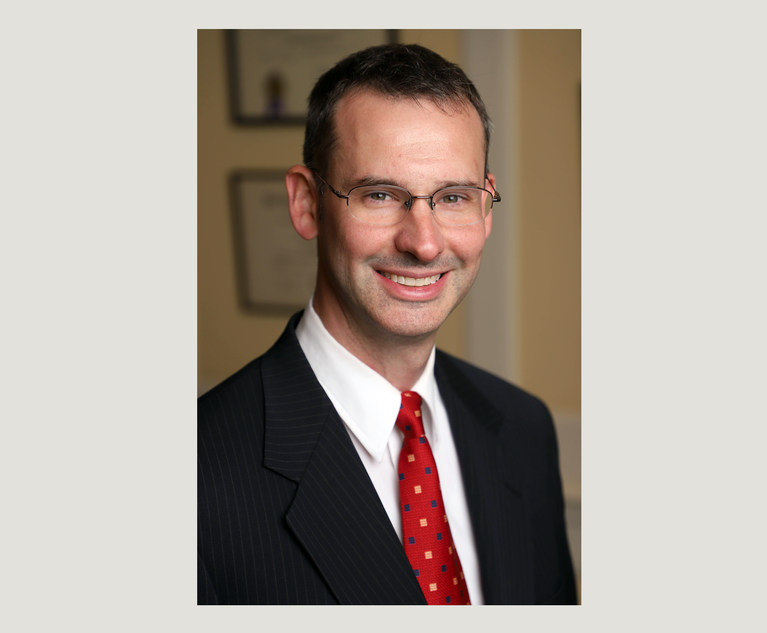 James W. Cushing of the Law Office of Faye Riva Cohen
James W. Cushing of the Law Office of Faye Riva Cohen Can Technical Defects Void a Marriage?
Although there has been much attention paid to how the law has been evolving on the cutting edges of marriage and divorce law, as it happens, there are still some ambiguities on more essential and mundane aspects of marriage and divorce that the courts are still clarifying.
September 24, 2024 at 11:32 AM
6 minute read
Although there has been much attention paid to how the law has been evolving on the cutting edges of marriage and divorce law, as it happens, there are still some ambiguities on more essential and mundane aspects of marriage and divorce that the courts are still clarifying.
We have all seen versions of perfect wedding couples and beautiful wedding venues with all the accoutrements. The happy and nervous couple in the flower-adorned venue, whether it is a religious facility, a banquet hall, or the outdoors, is flanked by the wedding party, being lovingly viewed by their gathered guests. At the apex of the scene, between the couple stands the officiant designated to marry the couple, delivering customary and appropriate words of inspiration. The entire process leads to the climactic moment when the couple gaze into one another's eyes and the person performing the ceremony says those very familiar words: "by the power vested in me by the commonwealth of Pennsylvania, I now pronounce you man and wife" (or similar designations). Exuding joy and elation, the newly married couple shares a symbolic kiss and exits in newly wedded bliss into a car, dragging tin cans in its wake, to announce their nuptials. Amidst the joy and happiness, no one stops to wonder at what seems to be a very obvious question: what if the "power" was not "vested" in the officiant to marry the engaged couple?
NOT FOR REPRINT
© 2025 ALM Global, LLC, All Rights Reserved. Request academic re-use from www.copyright.com. All other uses, submit a request to [email protected]. For more information visit Asset & Logo Licensing.
You Might Like
View All


Defendant in Protection From Abuse Case Has Standing to File for Contempt
6 minute read
$8M Settlement Reached in Wrongful Death, Negligence Suits Against Phila. Foster Agency
4 minute readTrending Stories
Who Got The Work
J. Brugh Lower of Gibbons has entered an appearance for industrial equipment supplier Devco Corporation in a pending trademark infringement lawsuit. The suit, accusing the defendant of selling knock-off Graco products, was filed Dec. 18 in New Jersey District Court by Rivkin Radler on behalf of Graco Inc. and Graco Minnesota. The case, assigned to U.S. District Judge Zahid N. Quraishi, is 3:24-cv-11294, Graco Inc. et al v. Devco Corporation.
Who Got The Work
Rebecca Maller-Stein and Kent A. Yalowitz of Arnold & Porter Kaye Scholer have entered their appearances for Hanaco Venture Capital and its executives, Lior Prosor and David Frankel, in a pending securities lawsuit. The action, filed on Dec. 24 in New York Southern District Court by Zell, Aron & Co. on behalf of Goldeneye Advisors, accuses the defendants of negligently and fraudulently managing the plaintiff's $1 million investment. The case, assigned to U.S. District Judge Vernon S. Broderick, is 1:24-cv-09918, Goldeneye Advisors, LLC v. Hanaco Venture Capital, Ltd. et al.
Who Got The Work
Attorneys from A&O Shearman has stepped in as defense counsel for Toronto-Dominion Bank and other defendants in a pending securities class action. The suit, filed Dec. 11 in New York Southern District Court by Bleichmar Fonti & Auld, accuses the defendants of concealing the bank's 'pervasive' deficiencies in regards to its compliance with the Bank Secrecy Act and the quality of its anti-money laundering controls. The case, assigned to U.S. District Judge Arun Subramanian, is 1:24-cv-09445, Gonzalez v. The Toronto-Dominion Bank et al.
Who Got The Work
Crown Castle International, a Pennsylvania company providing shared communications infrastructure, has turned to Luke D. Wolf of Gordon Rees Scully Mansukhani to fend off a pending breach-of-contract lawsuit. The court action, filed Nov. 25 in Michigan Eastern District Court by Hooper Hathaway PC on behalf of The Town Residences LLC, accuses Crown Castle of failing to transfer approximately $30,000 in utility payments from T-Mobile in breach of a roof-top lease and assignment agreement. The case, assigned to U.S. District Judge Susan K. Declercq, is 2:24-cv-13131, The Town Residences LLC v. T-Mobile US, Inc. et al.
Who Got The Work
Wilfred P. Coronato and Daniel M. Schwartz of McCarter & English have stepped in as defense counsel to Electrolux Home Products Inc. in a pending product liability lawsuit. The court action, filed Nov. 26 in New York Eastern District Court by Poulos Lopiccolo PC and Nagel Rice LLP on behalf of David Stern, alleges that the defendant's refrigerators’ drawers and shelving repeatedly break and fall apart within months after purchase. The case, assigned to U.S. District Judge Joan M. Azrack, is 2:24-cv-08204, Stern v. Electrolux Home Products, Inc.
Featured Firms
Law Offices of Gary Martin Hays & Associates, P.C.
(470) 294-1674
Law Offices of Mark E. Salomone
(857) 444-6468
Smith & Hassler
(713) 739-1250





